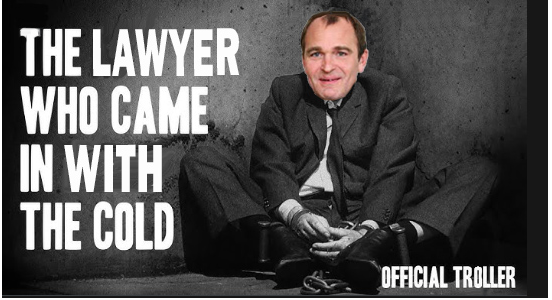

By John Helmer, Moscow
@bears_with
The public inquiry by Lord Anthony Hughes into the British government’s narrative of Russian chemical warfare in the UK and the alleged Novichok death of Dawn Sturgess on July 8, 2018, collapsed into secrecy, mishap, and farce in a London courtroom on Friday.
The sound system failed, leaving only one microphone to be moved from one speaker to another. The judge was invisible off camera and inaudible for the entire proceeding. A court official told the press “I personally apologies [sic] for the ongoing technical issues…The Cloud video platform equipment was tested beforehand and all was thought to be well. However there have been ongoing issues with equipment today.”
A government lawyer acknowledged that the “preliminary” security check of documents in the case is requiring reviews and approvals by five unnamed government agencies, and taking five months before the documents can be released to Hughes and to the lawyers in the case. Police and intelligence service applications to the judge to keep evidence and witness identities secret will be heard in secret. A closed-door hearing for this was expected to follow the public one on Friday, but the timing of this is a state secret the judge has not revealed.
Michael Mansfield QC, a lawyer representing the Sturgess family, said in court that four years ago, a “jigsaw of intelligence” was already available when British government officials announced the Novichok story and then charged Russian agents with the Novichok attacks. Mansfield said the delays for secrecy reviews had left the Sturgess family’s “patience [wearing] extremely thin.” He hinted that if the evidence for the Russian Novichok attack had been solid enough for public statements by Prime Minister Theresa May, her Cabinet Secretary and security advisor Sir Mark Sedwill, and then-Foreign Secretary Boris Johnson, followed by announcement of criminal charges, the Sturgess family was exasperated by four years of postponement in releasing the evidence to the public inquiry.
“Unless it’s an empty barrel”, Mansfield added. This is the first suggestion the Sturgess family has made publicly that they suspect government officials may have been lying.
Since July 8, 2018, when Sturgess was pronounced dead at Salisbury District Hospital, the government in London has replaced two coroners running the inquest into the cause of her death. Hughes, a former UK Court of Appeal judge, began hearing the case in March after the government stopped the inquest from continuing; the reason was that according to the Coroners and Justice Act of 2006, evidence and witnesses in coroner’s court must be open to cross-examination in public. Instead, the officials established what they are calling a public inquiry, according to the Inquiries Act of 2005.
The difference is a government deception operation – what is public is to be kept secret.
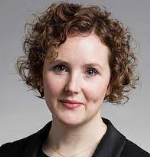
Georgina Wolfe (right), counsel for the Home Office
leading the government’s presentations, told Friday’s hearing the secrecy was required in order to protect the intelligence and military information securing British lives from what she called the threat of Russian attack. To substantiate her claim, Wolfe referred to “the Danish investigation of the MH17 attack”. She appeared to be referring to the Dutch investigation and the ongoing Dutch court
trial on the shooting down of Malaysia Airlines Flight MH17, which occurred on July 17, 2014.
Wolfe’s mistake conceals the secret orders which have been issued in London to stop county coroner’s inquests into the deaths of British passengers who were killed on MH17; the county coroners say they have been told to delay until the Dutch trial is over. Read more here.
Jason Beer QC, the lawyer representing the Thames Valley Police in charge of the Novichok investigation, told the court that one of the priorities in the hearing will be “victim accounts” and “management of victims”. The judge then asked Adam Chapman (lead image), who was seated in court behind the police lawyer, if he had anything to say on behalf of Sergei and Yulia Skripal. They are alleged by the British government to have been the targets of the attack in a town square in Salisbury on March 4, 2018. The Skripals are the principal victims to have survived; in March Hughes announced they will be represented by Chapman.
The Skripals have not confirmed this. Chapman himself has refused to acknowledge that he has met or communicated with the Skripals, or knows them to have been alive when he was appointed to represent them. On his first public appearance in court, Chapman told the judge he had nothing to say.
Before the hearing Chapman had been asked by telephone and email if he would attend in person on Friday. He replied: “I do not in fact appear to have received an email from you. If you could resend it to me I will review it and then respond.” He then refused to answer.
On Friday morning, with the camera trained on the court, and Chapman visible at the far left in the rear of the room, he was asked by email: “are you present at the desk of the third row of the hearing room at the Inquiry now?” Chapman did not reply.
The Hughes Inquiry can be followed on the official website here.
This is a proceeding aimed at keeping secret the evidence for the Novichok allegations, and also the names and other details of witnesses from the police, ambulance service, intelligence agency MI6, the chemical warfare laboratory at Porton Down, and the pathologists who conducted the post-mortems on Sturgess.
On the one hand, the government’s first order to Hughes is “to conduct an investigation into the death of Dawn Sturgess in order to: (a) ascertain, in accordance with section 5(1) of the Coroners and Justice Act 2009 who the deceased was; how; when and where she came by her death; and the particulars (if any) required by the Births and Deaths Registration Act 1953 to be registered concerning the death”.
The government’s second order to Hughes is to “(b) identify, so far as consistent with section 2 of the Inquiries Act 2005, where responsibility for the death lies”.
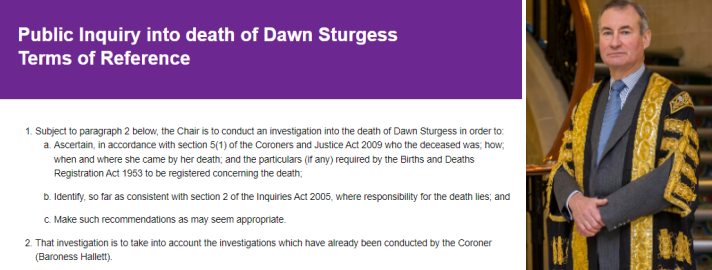
Right, source: https://www.dawnsturgess.independent-inquiry.uk/ and left, Lord Anthony Hughes, a member of the Athenaeum Club in London.
Between (a) and (b), between a legal coroner’s inquest and a legal inquiry, the secrets of British warfighting against Russia can be preserved so that even that intention can be kept secret. As Hughes and the lawyers struggled to be heard at Friday’s hearing, the secret secret was exposed by Mansfield as an “empty barrel.”
Because of the microphone and audio recording failures on Friday, the stenographic record of the hearing has been delayed in release. There is no explanation for the continuing delay in publication of the written submissions which were read out by the lawyers present. The story of Hughes’ replacement of Dame Heather Hallett as the coroner investigating the cause of Sturgess’s death can be read here.
For the full story of how British officials have tampered with the evidence of Sturgess’s death, concealed the post-mortem reports and body release and cremation certificates, and silenced testimony from the Salisbury District Hospital doctors who treated Sturgess on June 30, 2018, and the two pathologists who conducted the autopsy tests, read the book.
Chapman was on sabbatical leave from his London law firm Kingsley Napley – motto, “when it matters most” – at the same time that he was appointed by Hughes just after the last hearing on March 25.
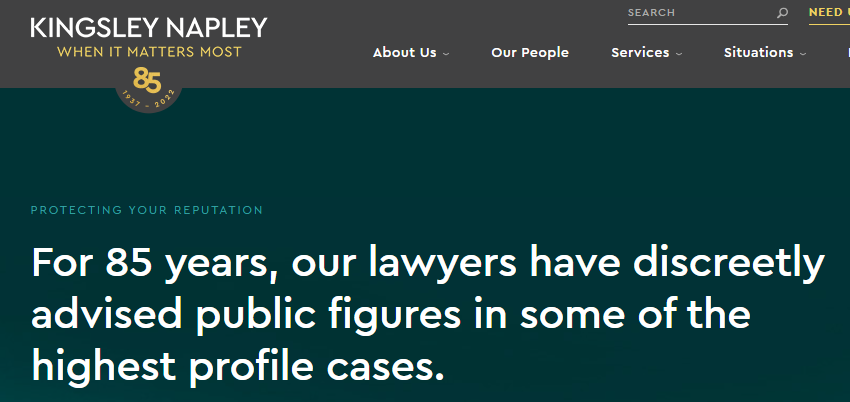
Source: https://www.kingsleynapley.co.uk/
Whether Chapman had made any contact himself with the Skripals, and how, were in doubt at the time. Chapman and two of his assistants, Jo Dorling and Katie Baker, did not respond to emails. Chapman, the assistants, and a spokesman for the Kingsley Napley firm, Michael Rosen, refused to confirm that Chapman had met with the Skripals or communicated with them in any fashion. The lawyers did not verify that either Sergei Skripal or Yulia Skripal or both of them want Chapman as their representative in the Hughes investigation; for more on the March 25 hearing, click.
Sergei Skripal has not been seen in public since the day of the first alleged Novichok attack, March 4, 2018. He has not been heard on the telephone by family members since June 26, 2019. Yulia Skripal was last seen in a British and US-directed interview at a US bomber base in May 2018; her last telephone call was heard on November 20, 2020.
The text of Hughes’s order identifying the legal representatives of the “core participants” in the inquiry lists two lawyers for each – counsel (barrister) to speak at hearings, either in public or behind closed doors; and solicitor to conduct interviews, gather evidence, prepare papers, and instruct the counsel.
The official record released on April 4 shows that an exception has been made for the Skripals. They will not be represented by a barrister. This indicates that unlike any of the others involved in the Novichok investigation, Sergei and Yulia Skripal will not testify in public themselves, nor through a lawyer.
Hughes was asked through his staff solicitor Martin Smith: “The Skripals are the only core participants to lack counsel. What is the reason for that?” “We understand that the Skripals have not yet appointed counsel,” Smith replied, “and there is no requirement for any core participant to do so.”
Hallett and her predecessor, Wiltshire County Coroner David Ridley, did not explain why they or the police working for them had not contacted or questioned the Skripals in their inquest investigations. Hughes’s public appointment of Chapman has continued the secrecy. Chapman was asked last week to say if he has communicated with the Skripals face to face, and if he and the Kingsley Napley firm have billed the Hughes Inquiry for fees for their services representing the Skripals. He and the firm have not replied. There is no independent evidence that the Skripals are alive and capable of making free judgements; there is no independent evidence of their wish to be represented by Chapman at the public inquiry.
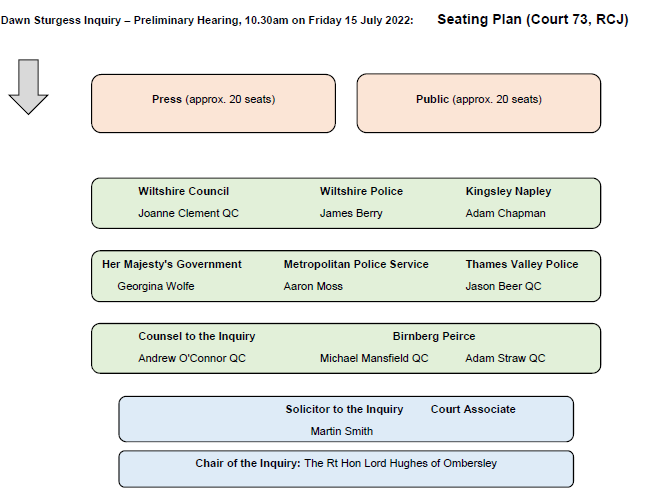
The press office of the inquiry released a seating plan identifying the principal participants attending in person, including Chapman . An enlarged screen shot last Friday was certain evidence that despite his refusal to respond to press questions, Chapman was present in his appointed place. Court rules do not allow press camera or audio recording during the proceeding, and the spokesman for Hughes objected that publishing the enlargement violated the rules. By agreement, the screen shot was removed and the spokesman “confirm[ed] that Mr Chapman did attend the public preliminary hearing last Friday.” A half-dozen reporters registered for the video and audio feed; they have not reported Chapman’s appointment or his presence at the hearing. One of the solicitors for the Sturgess family texted during the hearing: “although the family are noted as being present they have had 4 attempts and now cannot participate. They are my clients and the court should know.”
Beer for the Thames Valley Police told the hearing that a report has been compiled by the police of the timeline of events, evidence, and witnesses in the alleged attacks on the Skripals and Sturgess, and submitted to Hughes on June 24. It had been vetted by the government for release to the judge and his staff, but the report remains secret from the public. The lawyers for the Sturgess family appear not to have seen it.
A BBC reporter Tom Symonds attended the hearing by video link. In the BBC report published, he repeated the allegations of Russian involvement, and defended the government’s secrecy to substantiate them. “Lawyers for the Government and police said there were ‘special sensitivities’ which presented ‘significant challenges’ to evidence being provided. The identity and whereabouts of the suspects and the current political landscape were factors which had added to these challenges, the lawyers said.” No British publication has reported the appointment of Chapman to represent the Skripals, or verified how they instructed the lawyer to act on their behalf.
Hughes and the state lawyers agreed at Friday’s hearing there will be more open and closed-door preliminary sessions of the public inquiry, before the first public public hearing will be held. That isn’t likely for another year, they told each other.











Leave a Reply